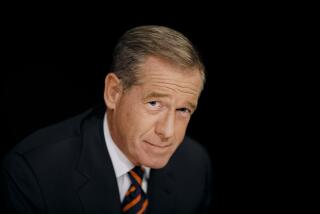The news, with an English accent
NEW YORK -- They speak English at the BBC, but CBS News veteran Rome Hartman still faced a language barrier when he was hired to create a newscast specifically for American viewers.
Almost all the TV terms he was accustomed to were different. The American anchorman is a “presenter” at the BBC. The producer works in a “gallery,” not a control room. And a voice-over is known as an OOV -- an acronym for “out of vision.”
“I’m not so arrogant that I think the entire BBC should adopt my lingo,” Hartman said, “but it does make my head hurt.”
Nearly four months of planning bear fruit today when the hourlong “BBC World News America” debuts at 4 p.m. on BBC America, a network available in about half the nation’s TV homes. Parts of the newscast will also be seen on PBS stations that regularly air news material from the British Broadcasting Corp.
Matt Frei, the BBC’s lead correspondent in the U.S. for the last five years, is the anchor. Oops, we mean presenter.
It was the second time in a year that Hartman had been asked to create a new newscast. He was Katie Couric’s first executive producer at the “CBS Evening News” and the fall guy when that went sour.
His goal each night, he says, is to “bring the world home to Americans.”
While many American networks boast of having a worldwide reach, it’s mostly just talk compared to the resources of the BBC, Hartman said.
CNN comes closest with its international staffing, but “if you look at what CNN broadcasts to an American audience, the appetite for world news on a daily basis for the domestic network is really quite limited,” he said.
“BBC World News America” won’t ignore breaking news from the United States -- but if you’re looking for extensive coverage of a tornado blowing apart some mobile homes, it’s best to turn to the American networks.
Besides news reports, the BBC will offer “60 Minutes”-style in-depth pieces, interviews by Frei and round-table discussions. For most viewers, it will complement rather than replace the American network newscasts.
“What we have to do is use what the people come to the BBC for,” Hartman said. “They come to us because they want a smart and sophisticated view of the world, and that’s what we hope to provide.”
For Hartman, there’s far less outside pressure than there was for his last start-up.
Couric’s early version of the “CBS Evening News” didn’t hold up, but he remains proud of the product. He said he doesn’t feel like he got a raw deal from CBS News.
“You climb up on the wire and you know you’re just as likely to get knocked off as not,” he said.
More to Read
The biggest entertainment stories
Get our big stories about Hollywood, film, television, music, arts, culture and more right in your inbox as soon as they publish.
You may occasionally receive promotional content from the Los Angeles Times.










